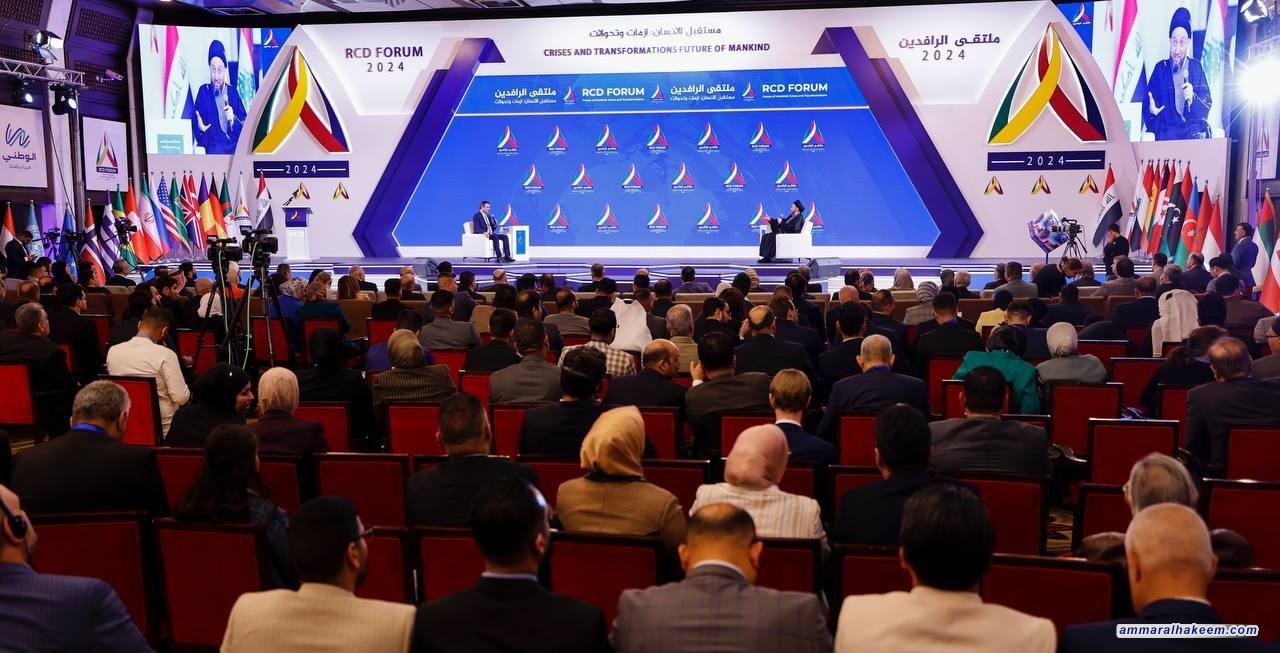Sayyid Al-Hakeem: Election law must reflect the political system’s philosophy representative, local wise, timeless, without dominance
Sayyid Ammar Al-Hakeem, Head of Al-Hikma National Movement, During the Rafidain Dialogue Forum, affirmed that the events of October 7th revealed a plan to transform the Palestinian cause into a landless people issue. His Eminence expressed regret for the international cover received by the Israeli entity and the disregard for Western values related to human rights, freedom of expression, women's and children's rights, and the fate of civilians during conflicts. H.E. stressed that the Palestinian issue is an enduring right, praising Iraq's support for the Palestinian cause and citing statements from Grand Ayatollah Ali Al-Sistani “May he long live”, government speeches, political powers, and social and media activities.
Responding to questions, Sayyid Al-Hakeem stated that regional talks contributed to aligning viewpoints and clarifying some ambiguous positions. H.E. highlighted the informal nature of these meetings, enabling discussions on issues challenging to address formally and diplomatically. H.E. emphasized the need for a balanced social equation that involves everyone, acknowledging the confusing results of the 2021 elections, which produced an uneven balance between voters and seats, with the notable absence of political blocs with social weights. H.E. stated that restoring balance in the next phase might turn the social contract into an urgent matter for discussion, development, and improvement, affirming that balance is essential for achieving stability, and stability is closely linked to development, which, in turn, leads to providing services and achieving popular satisfaction. H.E. called to intensify internal dialogue and illustrated that internal political dispute within the singular component is a healthy condition that will lead to political alignment nationwide and abandon component alignment.
Regarding armed factions, His Eminence described them as a natural outcome of a people bearing arms to defend their existence. H.E. emphasized the need to gradually integrate these factions into the state's path, considering the circumstances that contributed to the existence of armed forces, such as occupation, mistakes made, and international decisions describing the occupation, while taking into consideration the recent events of Gaza. H.E. praised the factions that support the government's negotiation path and alleviate pressure related to ending the international coalition against ISIS.
On the electoral law, Sayyid Al-Hakeem emphasized the necessity for the law to reflect the political system's philosophy at both national and local levels without domination. H.E. reminded that the previous period witnessed laws for each stage, while the recent elections approved a law not bound by a specific time. H.E. underlined that the electoral law is a fundamental prerequisite for achieving the balance that leads to stability, development, and popular satisfaction. H.E. stressed the importance of everyone understanding that the government's success relies on political support within the State Managing Coalition.
In response to a question about not participating in the tripartite alliance, H.E. stated that Al-Hikma Movement respects democratic rules and values numerical representation. H.E. explained that the election results did not translate into proportional seats for Al-Hiklma, and did not accept participating in a government without having parliamentary representation. H.E. clarified that this stance is not aligned with a specific side, and this is what happened with Mr. Al-Sudani’s government.
H.E. called for respecting the Federal Court's decisions as legal rulings related to interpreting the Constitution and laws, illustrating that its rulings benefit this side and that side within the context of interpreting such laws. H.E. expressed his support for federalism and the Kurdistan Region entity, mentioning that transitioning to a confederation stage does not receive universal support and acceptance.
H.E. also highlighted that Al-Hikma National Movement, like other political powers, witnessed the departure of some limited individuals while others adhered to its project and approach. H.E. pointed out the lengthy decision-making process within Al-Hikma Movement of internal discussions and dialogues to mature positions.


/9/3/photo_2025-12-10_09-25-13.jpg)
/9/2/photo_2025-12-10_09-17-58.jpg)
/9/1/photo_2025-12-10_09-11-13.jpg)
/8/3/photo_2025-12-09_10-42-49.jpg)
/8/2/photo_2025-12-09_10-37-31.jpg)
/8/1/photo_2025-12-09_09-54-18.jpg)
/7/1/photo_2025-12-08_09-38-41.jpg)
/5/1/photo_2025-12-07_09-25-35.jpg)
/3/2/photo_2025-12-04_11-05-55.jpg)
/3/1/photo_2025-12-03_11-49-28.jpg)